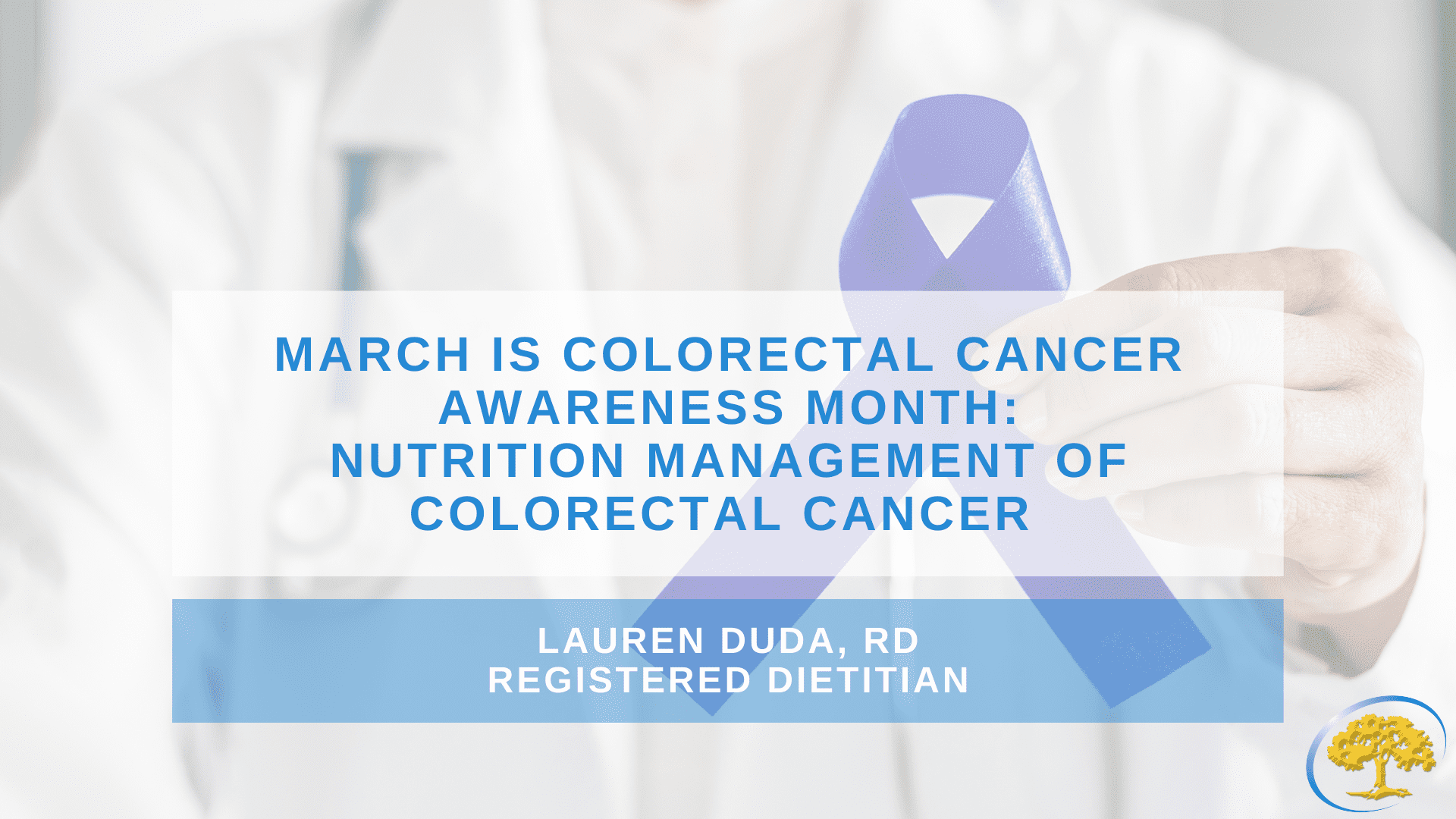
Posted 1 year ago
March is Colorectal Cancer Awareness Month: Nutrition Management of Colorectal Cancer
Did you know that colorectal cancer is the third most common cancer diagnosed in the United States for both men and women? Although they are two different cancers, colon and rectal cancer, depending on the origin of the tumor, the two are often grouped together because of their commonalities. The colon and the rectum both belong to the gastrointestinal (GI) tract and are key in the passing of food and excreting waste. Following surgery and/or during treatment, nutrition plays a key role in the management of the disease. March is Colorectal Cancer Awareness Month, and this month’s blog, we will be focusing on colorectal cancer and nutrition.
After diagnosis, some individuals will undergo surgery, where part or all of the colon is removed. In some cases, an ostomy is placed; depending on the case, it can be an ileostomy, a stoma (opening) connected to the end of the small intestine, or a colostomy, connected to the remaining part of the large bowel. No matter the outcome of the procedure, it can be difficult to process certain foods. It is important to adhere to a “low-residue” or “low-roughage” diet following the procedure, meaning avoiding foods that would make the GI tract work harder. Foods that would often be recommended as a part of a balanced diet are to be limited or avoided at this time, including high-fiber foods (raw fruits and vegetables, whole grains, beans/legumes, etc.). Other items to be excluded are carbonated beverages and fatty/fried foods. Some of examples of low-residue foods include white grains, lean/tender poultry, cooked fish, and vegetables and fruits that are well cooked/peeled.
Luckily, most patients can return to a normal, healthy diet within the few weeks following surgery and can slowly reintroduce fiber. However, it is always best to consult a registered dietitian, as the weeks following surgery are not “one size fits all”. As a dietitian myself, I am a huge advocate of completing a food diary and bringing it to your appointments. As tedious as it sounds, it acts as a helpful tool to identify food intolerances and record symptoms associated with food intake.
As treatment is initiated, nutrition remains extremely important in the management of the disease and the side effects of treatment itself. Here are some tips to consider during treatment:
1. Maintain a healthy weight and prevent weight loss as much as possible. As some side effects of treatment can make eating difficult, such as decreased appetite, nausea/vomiting, mouth and throat sores, and taste alterations, it is important to focus on consuming adequate calories and protein to avoid weight loss. Unintentional weight loss can lead to issues such as pauses in treatment, increased hospitalizations, and increased chances of illness.
2. Consume small, frequent meals. Incorporating what I like to call “mini meals” can be extremely helpful to ensure adequate calorie/protein intake and help manage side effects such as nausea and decreased appetite. Generally, 5-6 mini meals scheduled throughout the day is best.
3. Incorporate protein with every meal and snack. Protein is very helpful in recovery, satiety, and repair. Often with large amounts of weight loss comes decrease in muscle mass and protein can help with maintaining muscle. As you can tell, protein is essential for staying healthy during treatment. Focus on lean protein foods, such as chicken, fish, turkey, eggs, dairy, nuts/seeds, and beans/legumes. Omit the high-fiber foods if not permitted.
4. Ensure proper hydration. Regular fluid consumption is recommended to stay hydrated, especially when experiencing side effects such as vomiting and diarrhea. Electrolyte replacement may be recommended in these situations. Water should be consumed most, goal intake being 64oz per day.
5. Be mindful of bowel patterns. Treatment can often lead to gastrointestinal issues, such as diarrhea, constipation, and gas. It is best to relay these side effects to your physician and team so they can be managed with nutrition and/or medication.
Colorectal cancer can be a unique journey, as no two experiences are the exact same. Your healthcare team here at Ironwood Cancer and Research Centers is here to support and help you along the way, as you and your situation are important. If you are a patient or a loved one of a patient, the Supportive Care Services team here at Ironwood would love to assist. To speak to one of our Registered Dietitians, Social Workers, Genetic Counselors, or our Integrative Oncologist, Dr. Heidi Rula, you may contact us at wellness@ironwoodcrc.com or by calling us at 480-314-6670.
Lauren Duda, RD

Lauren’s interest in nutrition peaked at the age of 14, when she experienced a personal journey in developing her relationship with food. She decided that she wanted to help people like herself and educate the general public about nutrition. Becoming a registered dietitian was a clear career path and quickly became a dream of hers at a young age. Throughout the years, Lauren began to realize how necessary nutrition is in the management of disease, especially when witnessing her family members experience major health concerns. With this deepening her desire to care for others, Lauren ultimately knew that it was her goal to provide nutrition therapy in way that also values empathy, compassion, and kindness.
When she’s not working, Lauren loves spending her free time with friends, family, and her dog, Zeppelin. She enjoys listening to music, attending concerts, styling clothes, and hiking/biking during the cooler months.
